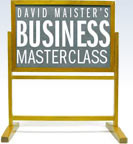

TITLE | TIME |
Real Professionalism | (17:16) |
What is the difference between a technician and a professional? David Maister pin-points the key attitudes and character traits that make the true professional in today’s business world.
RELATED RESOURCES:
Book
Blog Discussions
NOTES FOR THE EPISODE:
Timeline:
1:09 — True Professional or Great Secretary? Both! A list of qualities.
Great secretaries, I am told:
- Take pride in their work, and show a personal commitment to quality;
- Reach out for responsibility;
- Anticipate, and don’t wait to be told what to do -they show initiative;
- Do whatever it takes to get the job done;
- Get involved and don’t just stick to their assigned role;
- Are always looking for ways to make things easier for those they serve;
- Are eager to learn as much as they can about the business of those they serve;
- Really listen to the needs of those they serve;
- Learn to understand and think like those they serve so they can represent them when they are not there;
- Are team players;
- Can be trusted with confidences;
- Are honest, trustworthy and loyal; and
- Are open to constructive critiques on how to improve.
4:00 — David asks Julie O’Leary, his business manager of 17 yrs: Why would anyone who isn’t sharing the profits want to demonstrate this level of commitment?
“Professional is not a label you give yourself — it’s a description you hope others will apply to you. You do the best you can as a matter of self-respect. Having self-respect is the key to earning respect and trust from others. If you want to be trusted and respected you have to earn it. These behaviors lead to job fulfillment. The question should really be, “Why wouldn’t someone want to do this?” If someone takes a job, or starts a career worrying about what’s in it for them, looking to do just enough to get by, or being purely self-serving in their performance—they will go nowhere. Even if they manage to excel through the ranks as good technicians—they will not be happy in what they are doing. The work will be boring, aggravating, tiresome and a drag.”
6:11 — Real Professionalism vs. traditional views of professionalism
However, traditional definitions of “professionalism” are filled with reference to status, educational attainments, “noble” callings and things like the rights of practitioners to autonomy — the right to practice free of direction. All of these definitions are self-interested. (As George Bernard Shaw suggested “All professions are conspiracies against the laity.”)
10:50 — It’s Not (just) About the Money
If you review the list of behaviors above (commitment to quality, reaching out for responsibility, do what it takes to get the job done, etc.) it should be obvious that people who exhibited these behaviors would be on a fast-track path to economic success. As Julie pointed out, it is doing these things that earn you respect and trust, whether from colleagues or clients. If this is true — that professionalism works — then why don’t more people operate this way?
13:45 — The role of management in encouraging real professionalism:
So what is it that encourages people to act professionally and creates the environment that allows real professionals to flourish? The answers are as old as the hills, even if they are frequently forgotten. Here’s Julie’s advice again:
- Remember to show appreciation to the one who has taken that extra step or surprised you with an exceptional performance. This will breed more enthusiasm and more good work.
- Don’t be afraid to give people ever more responsible assignments — trust them — and if it doesn’t come out perfect, let them try again after you’ve given them some pointers. Everyone likes a challenge.
- Get people involved. Share reports, conversations, information about competitors and, clients, etc., so that everyone can see the big picture and how they fit into it.
- Constructive critiques are one of the most powerful learning tools available to the employee. Take the time to help people learn – not as a matter of performance appraisal, nor an issue of compensation, but simply as a sincere desire to help them improve.
- Don’t promote teamwork and then only recognize the captain. Make sure recognition is given to everyone in some way — it doesn’t have to be money — it can be as simple as saying “Well done. Take a friend to lunch — it’s on me.” Work hard to make people feel part of what’s going on.
15:49 — Closing thoughts for personal reflection:
I hope these thoughts cause the reader, whether a managing partner or a secretary, to ponder two questions that we all need to think about frequently: First, do other people consider me a professional? How well do those I serve think I meet the criteria on page one? Second, do I deal with those who work for me in such a way as to encourage their commitment and professionalism, or do I sometimes act to suppress it? How good am I at bringing out the professionalism in others?

















